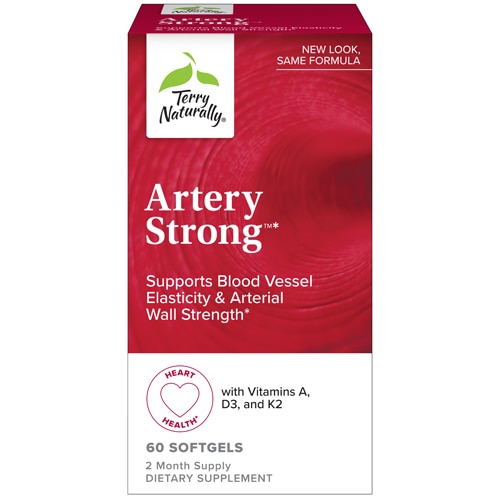[vc_row][vc_column][vc_column_text]When February arrives after the seemingly 300 days of January, hearts are everywhere we look. From Valentine’s Day candy hearts to exquisite, handcrafted chocolates, we’re reminded around every corner that love is officially in the air.
While Valentine’s Day may characterize the month for many, it’s important to keep in mind that it’s also
American Heart Month—a time to take an honest and thorough look at the efforts you’re making to ensure your ticker is in superb shape.

Add your artery health to your list of February to-dos. As a vital part of your cardiovascular system and overall wellness, your arteries play a critical role in circulation, ensuring that your tissues and organs receive the oxygen-rich blood they need. And while few of us pause to consider their “fitness,” now is the time to figure them into your holistic health plan: Without prioritizing your arteries’ efficiency and integrity, you may put yourself at risk for Coronary Artery Disease (CAD), which the CDC identifies as
the leading cause of death in the United States.
Fortunately, achieving artery health is entirely within your reach. Read on for our expert tips so that you can enjoy years of love and vitality.
What role do our arteries play, exactly?
People may bemoan the state of their bodies—whether for health or aesthetic reasons—but the human body is a genuine masterpiece that’s capable of actions and behaviors even the most sophisticated piece of technology would struggle to achieve.
Your arteries are a significant contributor to this. Simply put, these tube-like vessels keep you alive by transporting key matters throughout your body: oxygen, blood, hormones, and nutrients. Two types of arteries are persistently at work below your skin: muscular and elastic. Elastic arteries, such as your aorta, are situated close to your heart, while muscular arteries, like your brachial arteries, are comprised of smoother muscle. Together, they draw oxygen-rich blood from your heart and distribute them throughout your system, enabling you to accomplish everything from physical movements to thoughts.
Unlike veins, which pull deoxygenated blood from your organs and send it back to your heart, arteries have impressively thick walls that can endure the high pressure of blood that’s pumped out of your heart (with every of
beat of your heart, we should add). But this thickness doesn’t mean that your arteries are robust enough to handle the damage that may be done to them. This may cause plague to build up in your arteries, which narrows their diameter and affects the intricate freeway system that’s constantly at work. This may lead to a host of health conditions, such as:
- Atherosclerosis
- Blood clots
- High blood pressure
…and, of course, coronary heart disease.
What are the signs and symptoms of “clogged” arteries?
There are a battery of tests that can help you determine the state of your arterial (and cardiovascular) health. These include, but certainly aren’t limited to, echocardiograms, MRIs, and what’s known as angiography—a diagnostic test that uses imaging to observe how your blood is moving and if there are any notable blockages.
And yet, few of these tests are administered without first experiencing the signs and symptoms of compromised arteries. These may include:
- Chest pain
- Fatigue
- Numbness, tingling, and pain in your legs and arms
- Persistent stomach pain
- Shortness of breath/difficulty breathing
If any of these symptoms sound familiar, schedule an appointment with your trusted healthcare professional immediately.
What compromises artery health?
Like many parts of our bodies, our arteries change with age, gradually narrowing and becoming less pliable. And yet, lifestyle choices factor hugely into artery health and can accelerate the process. This includes:
- High blood pressure
- High cholesterol
- Obesity
- Smoking
- Inflammation
- Oxidate stress
- Eating processed foods
- Drinking excessive amounts of alcohol
- Diets high in trans fats, saturated fats, sodium, and sugar
- A sedentary lifestyle
- Chronic stress
- Sleep abnormalities (such as too little or too much rest)
Underlying medical conditions can also impact your arteries, such as diabetes and insulin resistance.
How can I support artery health naturally?
Luckily, there are dozens of ways to organically promote arterial health. Practicing the basics of optimal well-sleeping—seven to nine hours of deep, restorative sleep per night, a balanced, whole foods diet (and not the upscale market, of course), loads of hydration, consistent, heart-pumping exercise, and moderate (if any) alcohol consumption—is a surefire way to keep your arteries free from plague and operating at their peak.
Let’s peer at a few of the other most essential habits you can adopt—and a few that may be completely new to you.
1. Swap butter for extra virgin olive oil
We won’t deny the deliciousness of butter, particularly if it’s melting on a warm slice of chocolate-chip banana bread or used as a dip for a succulent slice of lobster. By and large, though, you should aim to cook and dress your salads with e
xtra virgin olive oil: Multiple studies have examined the effects of the Mediterranean diet, where olive oil is a staple, and found that those who follow it suffered less from coronary artery disease. Olive oil is rich in anti-inflammatory properties, which can help combat one of the causes of stiffened arteries; it also contains phenols, an antioxidant that inhibits the synthesis of LDL (or “bad”)
cholesterol.
†
2. Consider supplementing with hawthorn
Endemic to Northern Asia, parts of Europe, and North America, hawthorn has been used as a tonic to naturally foster
heart health since the first century. Studies on its effects on human health date back as far as 1896; today, it’s widely prized for its high concentration of flavonoids and oligomeric proanthocyanidins—antioxidants that, like those found in olive oil and an abundance of fruits and vegetables, help mitigate oxidate stress.
†
3. Replace one of your daily cups of java with an antioxidant-rich juice or tea
We’re certainly not here to tell you to give up coffee which, for many, is the highlight of their morning (if not day). While research indicates that a glut of caffeine can do more harm than good, studies also indicate that
moderate amounts of coffee may diminish the risk of coronary artery disease and atherosclerosis. That said, you might enhance your arterial health—and health in general—by trading in a cup of joe for a mug of green tea or a glass of pomegranate juice: Both offer a wealth of those oh-s0-crucial antioxidants. Don’t care for the taste of green tea? Black tea may be just as effective: According to a study conducted on 3,000 Saudi Arabian men, those who drank the highest quantities of
black tea had the lowest risk of CAD.
†
4. Weave “exercise snacks” into your daily routine
We all know that we need a minimum of thirty minutes of exercise per day, not just to keep our hearts healthy but also to keep our minds sharp, our weight in check, our bones and muscles strong, and our emotions in balance. This is a minimum, however, and none of us were built to spend eight to ten straight hours hunched over a monitor at our desks.
To this end, break throughout your workday for what Gen Z and millennials refer to as “movement snacks,” bite-sized bits of exercise that provide a burst of strength training and/or cardio. (Think: 45 seconds of lunges, 60 seconds of jump roping, or a three-minute walk.) Exercise of any sort improves circulation
and helps you maintain an ideal weight, while also kicking mental and physical stress to the curb.
5. Seek out vitamin C-rich eats
Vitamin C is a veritable boon, blessing us with everything from clearer, firmer skin to, yes, naturally supporting heart and arterial health. What few may realize is that the nutritional superstar may also help you nip stress in the bud, or at least not suffer the physical effects of it. A recent study performed by the University of Alabama discovered that 400 milligrams of vitamin C per day—roughly the amount you’ll find in a pint of fresh-squeezed orange juice—reduced the production of stress hormones.
† In addition to OJ, nosh on spinach, mangoes, tangerines, strawberries, tomatoes, kale and snow peas.
6. Suss out ways to remove heavy toxins from your environment
Most of us are well aware that heavy metals can wreak havoc on our wellness. But did you know that even minimal exposure to heavy metals can increase your vulnerability to atherosclerosis? While it may be impossible to shield yourself from heavy metals completely, you can certainly take concerted efforts to reduce your risk of exposure: Drink
filtered water, dodge tobacco products, dine on low-mercury fish, avoid plastic packaging and water bottles, opt for clean personal, cosmetic and cleaning products, and work up a sweat on a regular basis: Exercise functions as a natural (and enjoyable) detoxifier.
7. Up your Vitamin B12 intake
Technically known as cobalamin, vitamin B12 has a hand in several central biological functions, including metabolism and stress reduction. It’s also one of three major players in the creation of healthy red blood cells and helps moderate homocysteine—an amino acid that may contribute to cardiovascular disease. And yet, those who adhere to a vegan or vegetarian diet may be at risk of not obtaining enough of this critical nutrient. You may want to consider a
vitamin B12 supplement (with your healthcare provider’s express approval, of course) and consuming more vitamin B12-rich foods, such as fortified cereal, low-fat milk, plain Greek yogurt, fortified nutritional yeast, and Swiss cheese.
†
8. Indulge in dark chocolate
Dark chocolate is the holy grail of flavonoids, which help keep arteries strong but flexible. Just be sure to reach for dark chocolate 78% or higher; those below this concentration are notoriously overrun with dairy and sugar, which can undermine your efforts. And with the number of boxes of dark chocolate hearts available this month, you can easily show love to the person who matters most: You.
†These statements have not been approved by the Food and Drug Administration. These products are not intended to diagnose, treat, cure or prevent disease.[/vc_column_text][/vc_column][/vc_row][vc_row][vc_column][vc_text_separator title="Featured Products" border_width="2"][vc_row_inner equal_height="yes" content_placement="middle" gap="35"][vc_column_inner width="1/3"][vc_single_image image="164979" img_size="full" alignment="center" onclick="custom_link" img_link_target="_blank" css=".vc_custom_1676824257482{padding-right: 7% !important;padding-left: 7% !important;}" link="https://www.vitacost.com/christophers-blood-circulation-formula-465-mg-100-vegetarian-capsules"][/vc_column_inner][vc_column_inner width="1/3"][vc_single_image image="164977" img_size="full" alignment="center" onclick="custom_link" img_link_target="_blank" css=".vc_custom_1676824279372{padding-right: 7% !important;padding-left: 7% !important;}" link="https://www.vitacost.com/terry-naturally-artery-strong-60-softgels"][/vc_column_inner][vc_column_inner width="1/3"][vc_single_image image="164978" img_size="full" alignment="center" onclick="custom_link" img_link_target="_blank" css=".vc_custom_1676824298529{padding-right: 7% !important;padding-left: 7% !important;}" link="https://www.vitacost.com/vitacost-synergy-circulatory-support-with-grape-seed-extract-hawthorn"][/vc_column_inner][/vc_row_inner][/vc_column][/vc_row]
 Add your artery health to your list of February to-dos. As a vital part of your cardiovascular system and overall wellness, your arteries play a critical role in circulation, ensuring that your tissues and organs receive the oxygen-rich blood they need. And while few of us pause to consider their “fitness,” now is the time to figure them into your holistic health plan: Without prioritizing your arteries’ efficiency and integrity, you may put yourself at risk for Coronary Artery Disease (CAD), which the CDC identifies as the leading cause of death in the United States.
Fortunately, achieving artery health is entirely within your reach. Read on for our expert tips so that you can enjoy years of love and vitality.
Add your artery health to your list of February to-dos. As a vital part of your cardiovascular system and overall wellness, your arteries play a critical role in circulation, ensuring that your tissues and organs receive the oxygen-rich blood they need. And while few of us pause to consider their “fitness,” now is the time to figure them into your holistic health plan: Without prioritizing your arteries’ efficiency and integrity, you may put yourself at risk for Coronary Artery Disease (CAD), which the CDC identifies as the leading cause of death in the United States.
Fortunately, achieving artery health is entirely within your reach. Read on for our expert tips so that you can enjoy years of love and vitality.



